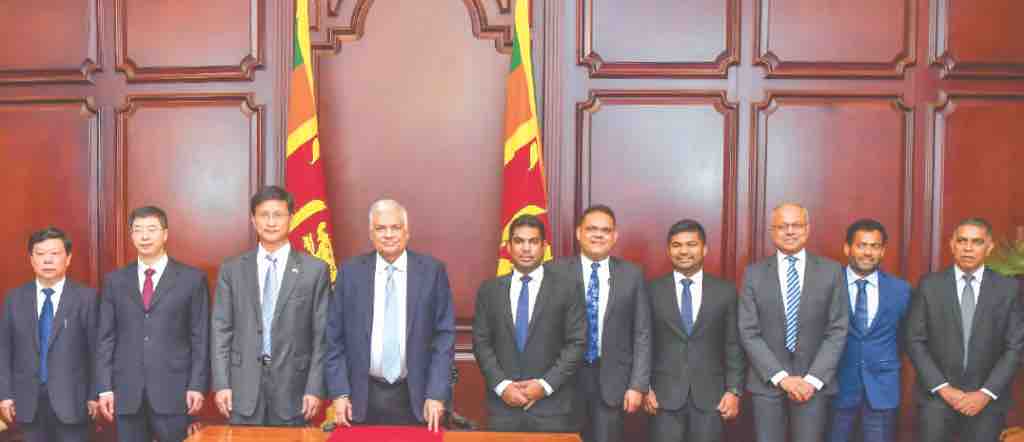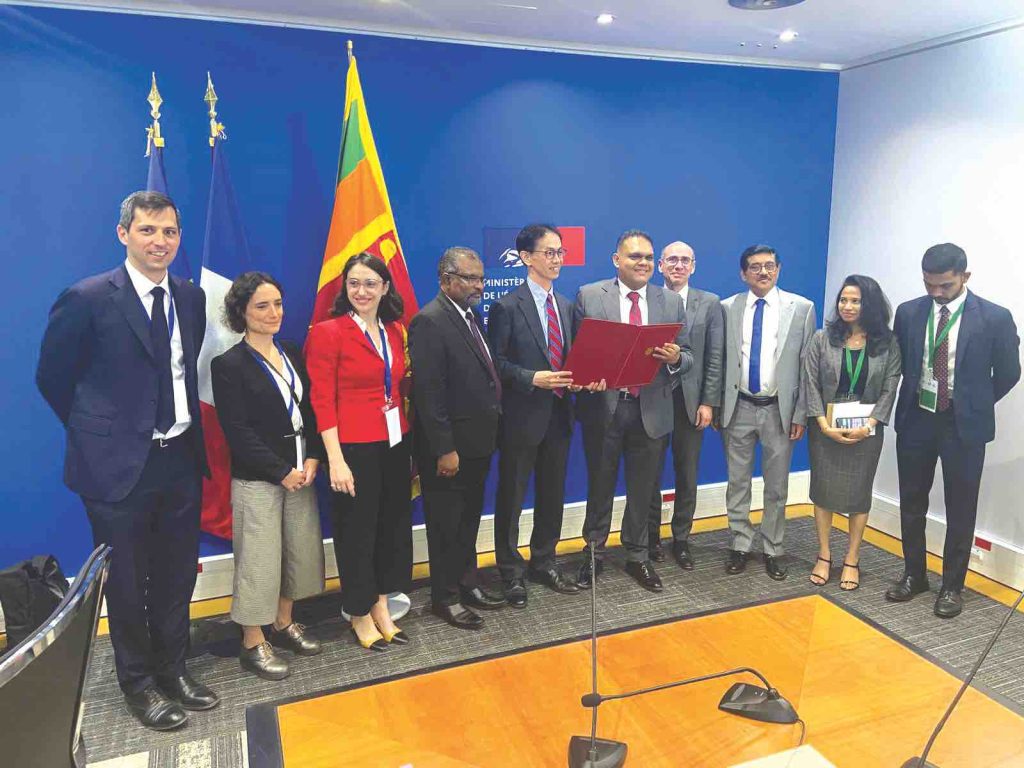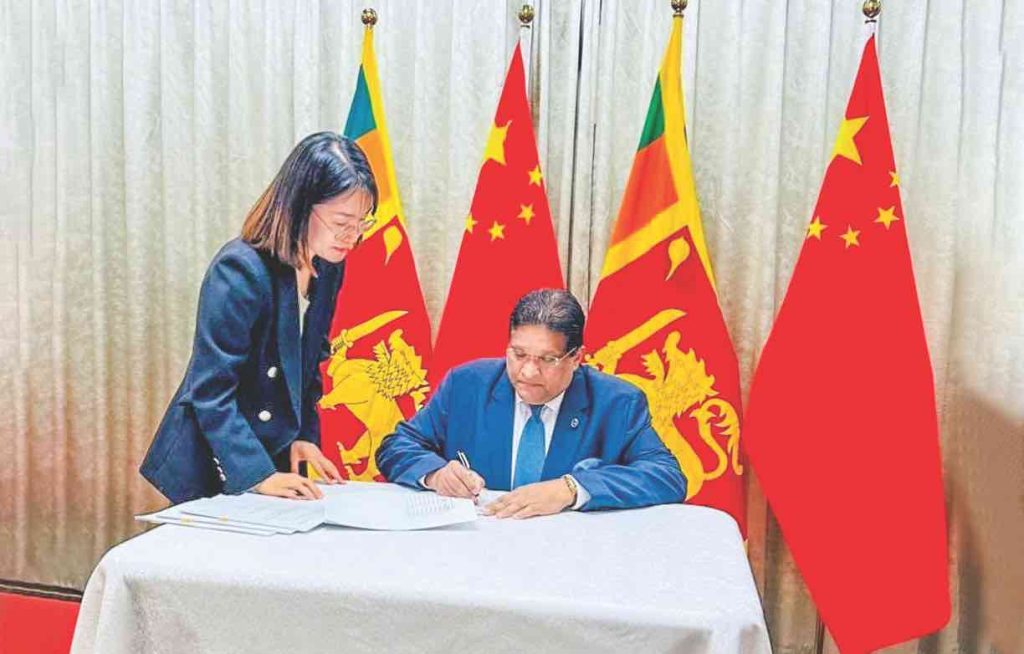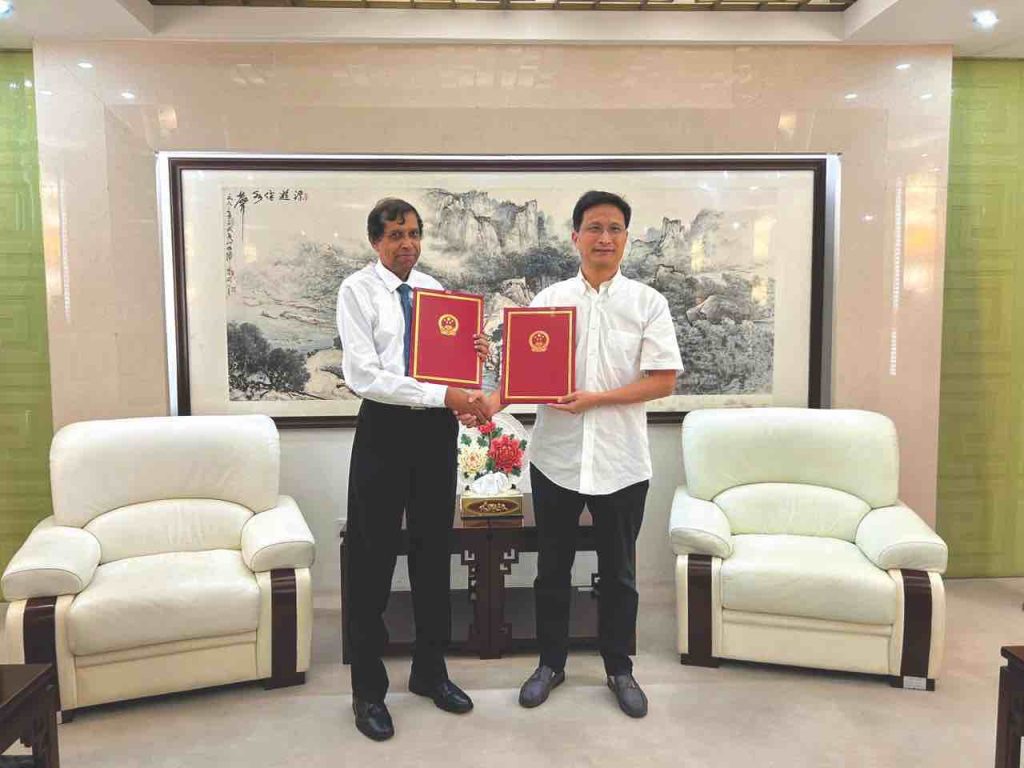
Kristalina Georgieva, Managing Director, IMF in discussion with President Ranil Wickremesinghe.
Introduction
Sri Lanka, grappling with a severe economic crisis marked by high inflation, depleted foreign reserves, and an unsustainable debt load, turned to the International Monetary Fund (IMF) for assistance.
In March 2023, the IMF approved a USD three billion Extended Fund Facility (EFF) to support Sri Lanka’s economic reforms and policies. This 48-month program aims to restore macroeconomic stability, ensure debt sustainability, and implement structural reforms to foster long-term growth.
IMF Program Objectives
The EFF-supported program is designed with several critical objectives in mind:
1 Restoring Macroeconomic Stability: This involves stabilizing the economy through revenue-based fiscal consolidation, aimed at reducing the fiscal deficit while protecting the most vulnerable populations.
2 Ensuring Debt Sustainability: The program emphasizes the importance of debt restructuring to achieve a sustainable debt level and equitable burden-sharing among creditors.
3 Safeguarding Financial Sector Stability: Measures include strengthening financial supervision, implementing a bank recapitalization plan, and enhancing crisis management frameworks.
4 Advancing Structural Reforms: These reforms are essential to unlocking Sri Lanka’s growth potential, improving governance, and enhancing transparency.

President Ranil Wickremesinghe, ministers and the IMF team in discussion.
Progress and Reforms
Since the approval of the IMF program, Sri Lanka has made significant progress in implementing these reforms, although challenges remain:
1. Economic Reforms: One of the notable areas of reform is the energy sector. In early 2022, retail fuel prices were adjusted to reflect cost-recovery levels, and private sector participation was increased to enhance competition and transparency. The inclusion of private firms such as Sinopec of China and United Petroleum of Australia has been a key step in this direction.
2. State-Owned Enterprises (SOEs): The government has undertaken efforts to restructure SOEs by improving financial transparency, accountability, and restricting foreign exchange borrowing. The establishment of the State-Owned Enterprise Restructuring Unit (SRU) within the Ministry of Finance is pivotal in these efforts. The SRU is responsible for overseeing the restructuring and divestment of key SOEs, with reputable firms like the International Finance Corporation (IFC) acting as transaction advisors.
3. Fiscal Policies: The government has pursued fiscal consolidation through progressive tax reforms aimed at increasing revenue while safeguarding social safety nets. Enhanced tax administration, public financial management, and expenditure management are critical components of these efforts. The introduction of greater exchange rate flexibility is also expected to help rebuild the reserve buffer as market confidence returns.
Recent Developments
In March 2024, the IMF and Sri Lankan authorities reached a staff-level agreement on the second review of the EFF-supported program. This agreement indicates that Sri Lanka is on track with its economic policies and reforms. Upon completion of this review by the IMF Executive Board, Sri Lanka will gain access to an additional USD 337 million in financing. Key prerequisites for this approval include the implementation of prior actions and sufficient progress in debt restructuring.
In a significant development, Sri Lanka has also reached agreements with major creditors. An agreement with the Paris Club and the Export-Import Bank of China (Chinese Exim Bank) has been crucial in securing the necessary financial assurances. These agreements have provided a framework for debt restructuring, which is essential for the successful implementation of the IMF-supported program and for achieving long-term debt sustainability.
Advantages of Agreements with the Paris Club and Chinese Exim Bank
1. Comprehensive Debt Restructuring Framework:
– The Paris Club agreement provides a collective platform for negotiating debt restructuring terms with multiple creditor countries, ensuring a coordinated and equitable approach. This minimizes the risk of unilateral actions by individual creditors, which could complicate the debt restructuring process.
– The Chinese Exim Bank’s participation is significant given China’s substantial share of Sri Lanka’s debt. This agreement demonstrates China’s commitment to supporting Sri Lanka’s recovery efforts, aligning with the broader international community’s goals.
2. Enhanced Financial Stability:
– These agreements pave the way for restructuring Sri Lanka’s external debt, thereby reducing the immediate debt servicing burden. This will free up fiscal space for the government to invest in critical areas such as healthcare, education, and infrastructure, fostering long-term economic growth.
– By restructuring debt, Sri Lanka can improve its credit rating over time, which is crucial for regaining access to international financial markets on favorable terms.
3. Boost to Investor Confidence:
– Securing agreements with major creditors like the Paris Club and the Chinese Exim Bank sends a positive signal to international investors and markets about Sri Lanka’s commitment to economic reforms and debt sustainability. This can attract foreign direct investment and enhance economic recovery.
– The involvement of reputable international financial institutions in the restructuring process assures investors of a transparent and credible approach to debt management.
Path to Exiting Debt Default Status
With the successful implementation of the IMF program and the debt restructuring agreements, Sri Lanka can gradually move towards exiting its debt default status. The key steps in this process include:
1. Implementing Reforms Consistently:
– Sri Lanka must continue with its economic and structural reforms to stabilize the economy, enhance revenue collection, and manage expenditures efficiently. Sustained fiscal discipline will be crucial.
2. Rebuilding Foreign Reserves:
– By restoring market confidence and improving its export earnings, Sri Lanka can rebuild its foreign reserves. Greater exchange rate flexibility and favorable terms of trade will support this effort.
3. Improving Governance and Transparency:
-Strengthening institutional frameworks, improving governance, and enhancing transparency in public financial management will be critical. This includes regular publication of audited financial statements for SOEs and stringent anti-corruption measures.
4. Negotiating Favorable Debt Terms:
– Continuous engagement with creditors to secure favorable restructuring terms and possibly debt relief will be necessary. This involves maintaining good relations with both bilateral and multilateral creditors.
5. Restoring Economic Growth:
– Fostering a conducive environment for economic growth through investment in key sectors, enhancing productivity, and diversifying the economy will help increase revenue and reduce dependence on external borrowing.

Chen Chengmin, Managing Director of Fuel Production and Marketing Department of Sinopec Company; a representative from Sinopec; Chinese Ambassador Qi Zhenhong; President Ranil Wickremesinghe; Kanchana Wijesekera, Minister of Power and Energy; Shehan Semasinghe, State Minister of Finance; D.V. Chanaka, State Minister of Power and Energy; Sagala Ratnayake, President’s Senior Advisor on National Security and Chief of Staff; Indika Anuruddha, State Minister of Power and Energy; and M.P.D.U.K. Mapa Pathirana, Secretary of the Ministry of Power and Energy.

Shehan Semasinghe, State Minister of Finance with officials from the Paris Club; William Roos, Co-Chairman Paris Club and Assistant Secretary for Multilateral Affairs, Trade and Development Policies Department; Nandalal Weerasinghe, Governor, Central Bank; Mahinda Siriwardana, Secretary to the Treasury and Ministry of Finance, Economic Stabilization and National Policies and other delegates.

Majintha Jayesinghe, Ambassador of Sri Lanka to the People’s Republic of China, signed the agreements, signifying Sri Lanka’s final agreement with China’s Exim Bank on debt restructuring.

Ananda Kithsiri Seneviratne, Deputy Secretary to the Treasury, and Qi Zhenhong, Ambassador of the People’s Republic of China to Sri Lanka, exchanged agreements to signify Sri Lanka’s final agreement with China’s Exim Bank on debt restructuring.
Impact and Future Outlook
The IMF program has started to yield positive results. Inflation has begun to moderate, and economic activity shows signs of recovery. However, the path to full economic stability and growth remains challenging. Sustaining reform momentum, addressing governance weaknesses, and ensuring timely debt restructuring are critical for long-term recovery.
Sri Lanka’s commitment to these reforms, supported by the IMF and other international partners, aims to rebuild investor confidence and lay the foundation for a resilient economy. The journey ahead involves balancing immediate economic stabilization with the need for deep structural changes to achieve sustainable growth.
Conclusion
Sri Lanka’s engagement with the IMF through the EFF-supported program is a pivotal step towards overcoming its severe economic crisis. While significant progress has been made, the journey is far from over. The successful implementation of the program’s objectives will be crucial for Sri Lanka to achieve lasting economic stability and growth.
The continued support of international partners and sustained commitment to reforms will play a vital role in this challenging yet hopeful path forward.





